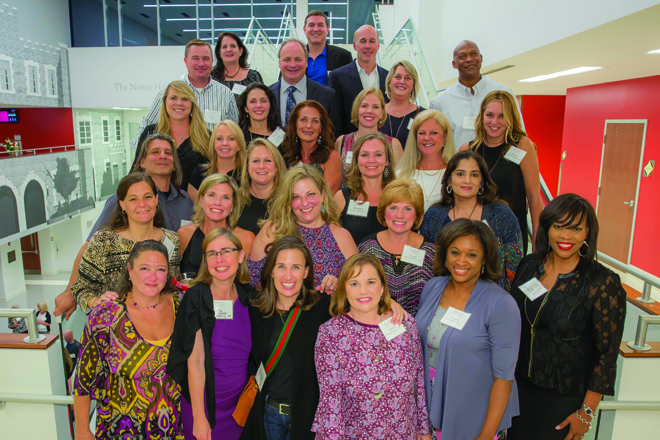Article by Kelly Sanderson, Woodward Academy
Woodward Academy’s president, Stuart Gulley, has always been interested in developing our faculty and staff. He also believes in developing leaders for the Atlanta community we serve and for other independent schools. He wants people to be happier and engaged in what they do, believing that children’s lives and education are enhanced when people are happy in their careers. From his vision came the idea of a leadership program to engage employees who are interested in being leaders and more self-aware and fulfilled in their roles.
The initial program was one year. It was modeled loosely on Leadership Atlanta, one of the oldest community leadership programs in the United States. We also worked with The Leaders Lyceum, an organization that helps develop leaders. After the second year, it was expanded to two years.
Eight years after starting the program, almost 30 percent of our 650 employees have gone through what we call Leadership Woodward.
Eight years later, almost 30 percent of our 650 employees have gone through what we call Leadership Woodward. Any employee may participate; in fact, we craft each class to be as diverse as possible, by job function, gender, race, ethnicity and so on. Every department has been represented; we’ve had teachers, bus drivers, dining hall employees, IT staffers, division assistants, and staff from the facilities, marketing and communication, admissions and advancement areas.
Both years of LW run simultaneously. The first year is called “How Woodward Works,” and participants see how their position fits with the school overall. Twenty participants, in groups of four, meet twice a semester from 10 a.m. until 3 p.m. They get to know members of the board and the administrators, and participate in activities including guest speakers, brief “goldmine sessions” and a scavenger hunt that takes them all over campus to talk with people they may have never met. At the end of the year, they complete a simple project about what they’ve learned, maybe in the form of a presentation, a song or a booklet that conveys to the class how Woodward does indeed work.
In its second year, LW focuses on self-awareness and personal growth. This is facilitated by The Leaders Lyceum, headed by a psychologist and professional growth expert named Keith Eigel. TLL helps participants understand where they fit in the leadership spectrum before they learn how to advance. They do this through personality profiling, mentoring, videos followed by discussions about how they would handle certain situations, and writing values statements.
Improved Communication
I was a graduate of the first class of LW, when I was the school’s assistant vice president. The program helped me see where I fit within the leadership spectrum, and it was beneficial when I was an applicant for the CFO position. I don’t think I would be as effective in my work or as strong at interacting with other people and meeting them where they are had I not gone through the program. I’m hugely grateful to have a leader willing to invest in me personally.
Communication and problem-solving have improved at Woodward. We think that’s happening because people are more comfortable with each other.
Other employees who have been through LW say they feel more confident in how the school makes decisions. They rate the program highly in surveys, often write letters of appreciation for the opportunity to participate, and sometimes stop me or Dr. Gulley to let us know how much they enjoyed it. The best evidence of its success is that at least four people apply for every space available.
Communication and problem-solving have improved at Woodward. We think that’s happening because people are more comfortable with each other. When issues come up, those who’ve been through the program are more apt to work together effectively. Friendships have developed that we wouldn’t have expected.
We also know that while LW has helped individuals progress into different positions at Woodward, it has been equally successful in helping people who don’t want to advance their careers feel satisfied in their jobs. Those are our “leaders in place.” They are happier in their jobs, more communicative and have a greater appreciation of the school.
One possible consequence of developing leaders is the risk that we will lose talented people. We’re okay with that. We are fortunate at Woodward in having a leader who wants to know everyone on campus, and who believes in cultivating other people whether they stay at Woodward or grow somewhere else. It makes for better educators overall.





